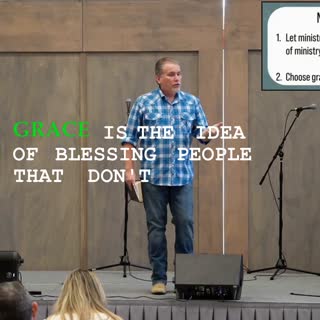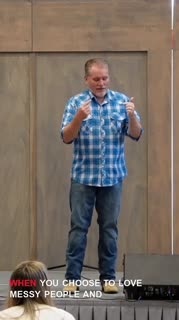Transforming Relationships Through Love and Grace
Devotional
Sermon Summary
Bible Study Guide
Sermon Clips
"We have to adopt the idea, adopt the position that I am doing small group life to love messy people rather than to be loved myself. Let me say that again. I enter into small group life with other people with the purpose of me loving messy people rather than me entering that small group life so that people will pour into me and that I feel loved. If we take that position, we stand a much better chance of having healthy small groups and healthy relationships." [00:10:51] (29 seconds)
"Scripture says that Jesus came to serve and not to be served. That's who he is, and that's how he loved. Jesus walked into a small group with the intent and purpose of loving messy people rather than being loved. Whether you're in a small group or not, if you get in a small group here shortly, you've got to adapt. You've got to adopt that attitude." [00:29:07] (24 seconds)
"Grace is the idea of blessing people that don't deserve to be blessed. It's pouring out. That's, it's this serving. It's, it's in John 13, right after Jesus said that, it said that he loved his people well, he goes on and he washes his disciples' feet. Again, that's a whole nother sermon for a whole nother time. But in that day, people walked around in those dirty, dusty Jewish roads. Their feet were filthy. They'd come to somebody's house. And the lowest servant, the lowest servant, in the home's job was to wash those people's feet as they walked to the house." [00:33:00] (30 seconds)
"When you choose to love messy people and you walk into your relationships, you walk into your small group going, I'm here to love messy people, not to be loved. It's in those moments that God shows up. Not always in the way you'd expect it. Doesn't mean your small group might not drop the ball for you. But God shows up. And he grows. He grows us. And we start living the life he desired us to live." [00:38:11] (30 seconds)
Ask a question about this sermon
"Scripture says that Jesus came to serve and not to be served. That's who he is, and that's how he loved. Jesus walked into a small group with the intent and purpose of loving messy people rather than being loved. Whether you're in a small group or not, if you get in a small group here shortly, you've got to adapt. You've got to adopt that attitude." [00:29:07] (24 seconds)
"Grace is the idea of blessing people that don't deserve to be blessed. It's pouring out. That's, it's this serving. It's, it's in John 13, right after Jesus said that, it said that he loved his people well, he goes on and he washes his disciples' feet. Again, that's a whole nother sermon for a whole nother time. But in that day, people walked around in those dirty, dusty Jewish roads. Their feet were filthy. They'd come to somebody's house. And the lowest servant, the lowest servant, in the home's job was to wash those people's feet as they walked to the house." [00:33:00] (30 seconds)
"When you choose to love messy people and you walk into your relationships, you walk into your small group going, I'm here to love messy people, not to be loved. It's in those moments that God shows up. Not always in the way you'd expect it. Doesn't mean your small group might not drop the ball for you. But God shows up. And he grows. He grows us. And we start living the life he desired us to live." [00:38:11] (30 seconds)








